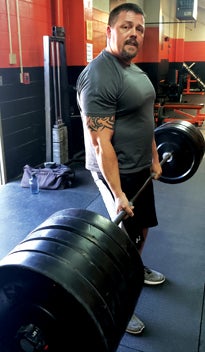Brains and Brawn… Bench off
Published 6:23 pm Friday, June 25, 2021
|
Getting your Trinity Audio player ready...
|
BY CHAD SALYER
Divisions abound in our modern world. Common ground is increasingly rare between people with even slightly different life experiences and world views.
One thing that can bridge those divisions is sport and healthy competition. It can give people that common ground and shared experience that help them begin to understand each other.
With the recent injection of politics, even sports have started to become a divisive force. Some people eat, breathe, and sleep politics, but the rest of us need an escape and sports can still provide this, even in the form of weightlifting.
As a young man, I took a job at the Northeast Correctional Complex as a correctional officer. As divided groups go, you would be hard-pressed to find a more divided group than inmates and correctional officers.
One thing I had in common with the inmates, though, was an interest in weightlifting.
I was once assigned to supervise the minimum security area including the recreation area that housed the weightlifting equipment. A remarkably strong inmate was working out on the bench with 315 pounds. 315 pounds is three 45 pound plates on both sides of a standard barbell.
Many lifters see this as a sort of “gold standard” for upper body strength. The inmate noticed that I was watching him and commented in a good-natured way, “I bet you wish you could bench this much, boss.”
I had not noticed, but suddenly the 30 or so inmates who were out at the weightlifting area were watching my response. So, when I said, “I warm up with that.”
The inmates all reacted with whoops and catcalls. The inmate benching said, “Alright, boss. Show us what you got.” Now, it was potentially unwise to accept this challenge, but I sensed it was made in the spirit of friendly competition.
So, I sat on the bench.
If any of the inmates in this area were not paying attention before, they were now. So, I took the weight off the rack and pressed it fairly easily. There were more whoops and shouts from those watching.
The inmate who had initially challenged me said, “Ok, ok, we will go up by 10 until one of us misses the weight.”
And so we did, up and up to 395. We both pressed that one, but it was hard. Next up was 405, four 45 pound plates on both sides of the barbell. It looked intense when that weight was loaded.
I was a bit nervous. I had not benched that much at that time, even in a friendly gym, much less with some 40 or 50 potentially not-so-friendly people watching intently. The inmate went first.
He came very close but missed the bench near the top of the rep. So, it was my turn.
I laid down on the bench and took the weight off the rack. It felt like a ton. All the way down to my chest I was thinking, “This is going to be tough.” As I started to push the weight up, it moved so slow but did not stop.
I slowly locked the weight out and placed it back in the rack. I sat up and the inmates shouted and yelled like I had never heard before.
I was initially concerned. I was worried the inmates were upset that I had won, but the opposite was true. They were soon patting me on the back and shaking my hand.
Finally, the inmate who had challenged me came up and with a smile said, “Good bench, boss.” We shook hands. I won a measure of respect from the inmates that day and gained some respect for them as well.
Both of these things served me very well for the remainder of my career in corrections.
Sports and healthy competition are one of the best ways to relate to people with different backgrounds. It can bring people together in ways nothing else can.






